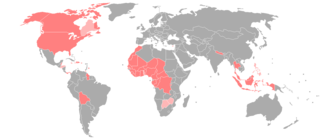Related Research Articles
The Bete language of Nigeria is a nearly extinct language spoken by a small minority of the 3,000 inhabitants of Bete Town, Takum, Taraba State; its speakers have mostly shifted to Jukun Takum. It is close to Lufu.

Yobe is a state located in northeastern Nigeria. A mainly agricultural state, it was created on August 27, 1991. Yobe State was carved out of Borno State. The capital of Yobe State is Damaturu; its largest city is Potiskum.

Borno State is a state in the North-East geopolitical zone of Nigeria, bordered by Yobe to the west, Gombe to the southwest, and Adamawa to the south while its eastern border forms part of the national border with Cameroon, its northern border forms part of the national border with Niger, and its northeastern border forms all of the national border with Chad, being the only Nigerian state to border three foreign countries. It takes its name from the historic emirate of Borno, with the emirate's old capital of Maiduguri serving as the capital city of Borno State. The state was formed in 1976 when the former North-Eastern State was broken up. It originally included the area that is now Yobe State, which became a distinct state in 1991.
The Kurama or T'kurmi or Akurmi language is a Kainji language of Nigeria. Kurama speakers are found in the central northern Nigerian states of Kaduna, Bauchi, Borno, Kano, Jigawa and Plateau.
Mala may refer to:

There are over 525 native languages spoken in Nigeria. The official language of Nigeria is English, the language of former colonial British Nigeria. As reported in 2003, Nigerian English and Nigerian Pidgin were spoken as a second language by 100 million people in Nigeria. Communication in the English language is much more popular in the country's urban communities than it is in the rural areas, due to globalization.

Bata (Gbwata) is an Afro-Asiatic language spoken in Nigeria in Adamawa State in the Numan, Song, Fufore and Mubi LGAs, and in Cameroon in North Province along the border with Nigeria. Dialects are Demsa, Garoua, Jirai, Kobotachi, Malabu, Ndeewe, Ribaw, Wadi, and Zumu (Jimo). It is often considered the same language as Bacama.
Fali, or Fali of Mubi after the local city, is a Chadic dialect cluster spoken in Nigeria, in Adamawa State in the Mubi North and Michika LGAs. It is one of several languages in the area that go by the generic name Fali.
Bure, also known as Bubbure, is an Afro-Asiatic language belonging to the Bole-Tangale group of the West branch of the Chadic family. It is spoken in northern Nigeria in the village of Bure and in some small settlements nearby. The language is used mostly by a very few speakers, of great-grandparental generation. Except for Hausa, which is lingua franca in the area, Bure is surrounded by other Chadic languages such as Gera, Giiwo and Deno . Compared to other languages of the same group, the endangerment of Bure is by far the most critical.

Karai-Karai is a language spoken in West Africa and most prominently North eastern Nigeria. The number of speakers of Karai-Karai is estimated between 1,500,000 to 1,800,000 million, primarily spoken by the ethnic Karai-Karai people. It is an Afro-Asiatic language spoken principally in Nigeria with communities in Bauchi State, Yobe State, Gombe State and other parts of Nigeria. Many Karai-Karai words are originated from the Northwest Semitic languages of Hebrew and Arabic. Karai-Karai language is most closely related to the Ngamo and Bole languages which are both considered derivatives of the Karai-Karai language.
The East Kainji languages are spoken in a compact area of the Jos Plateau in Nigeria, near Jos. There are more than 20 of them, most of which are poorly studied.
Jili (Lijili) is a Plateau language of Nigeria. It is one of several languages which go by the ambiguous name Koro.
The Jijili language, Tanjijili, also known as Ujijili, is a Plateau language of Nigeria. It is one of several languages which go by the ethnic name Koro.
Yankam (Yangkam), or Bashar (Basherawa), is a moribund Plateau language of Nigeria. It is located to the west of Bashar town in Plateau State.
Manep is a Papuan language of Sumgilbar Rural LLG, Madang Province, Papua New Guinea.
Mala, or Pay, is a Papuan language of Madang Province, Papua New Guinea.
Lere is a nearly extinct Kainji dialect cluster of Nigeria. The ethnic population was cited as 16,000 in 2000, of whom only a few speak the language. A wordlist from the Takaya dialect can be found under External links.
Malaryan is an extinct Dravidian language of Kerala and Tamil Nadu that was closely related to Malayalam.
Mala Malasar is an unclassified Southern Dravidian language spoken by a Scheduled tribe of India. It is close to Irula.

American Sign Language (ASL) developed in the United States and Canada, but has spread around the world. Local varieties have developed in many countries, but there is little research on which should be considered dialects of ASL and which have diverged to the point of being distinct languages.
References
- ↑ Mala at Ethnologue (18th ed., 2015)
- ↑ Blench, Roger (2019). An Atlas of Nigerian Languages (4th ed.). Cambridge: Kay Williamson Educational Foundation.